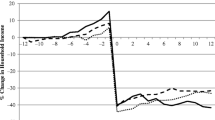Abstract
This paper measures the impact of child support reforms on payments to divorced mothers and welfare participation rates among them. A Stackelberg model of divorced parents’ behavior is calibrated to data from Wisconsin, where child support payments increased from $2,175.35 to $3,431.77 and welfare participation rates decreased from 33.5% to 9% between 1981 and 1992. Results show that new guidelines accounted for 24.4% and improved enforcement for 74% of the increase in payments. Higher payments accounted for a 3.9-percentage-point decline, decreasing welfare benefits an 8.4-percentage-point decline, and the two combined a 15-percentage-point decline in the welfare participation rate.
Similar content being viewed by others
References
Argys LM, Peters HE (2003) Can adequate child support be legislated? Responses to guidelines and enforcement. Econ Inq 41(3):463–479
Bartfeld J (2000) Child support and the postdivorce economic well-being of mothers, fathers and children. Demography 37(2):203–213
Bassi LJ, Lerman RI (1996) Reducing the child support welfare disincentive problem. J Policy Anal Manage 15(1):89–96
Del Boca D, Flinn CJ (1995) Rationalizing child support decisions. Am Econ Rev 85(5):1241–1262
Del Boca D, Ribero R (2001) The effect of child-support policies on visitations and transfers. Am Econ Rev 91(2):130–134
Fleisher BM, Rhodes G (1979) Fertility, women’s wage rates, and labor supply. Am Econ Rev 69(1):14–24
Freedman DS, Thornton A (1982) Income and fertility: the elusive relationship. Demography 19(1):65–78
Freeman RB, Waldfogel J (2001) Dunning delinquent dads: the effects of child support enforcement policy on child support receipt by never married women. J Hum Resour 36(2):207–225
Garfinkel I, Miller C, McLanahan S, Hanson T (1990) The Wisconsin child support assurance system: estimated effects on poverty, labor supply, caseloads, and costs. J Hum Resour 25(1):1–31
Garfinkel I, Miller C, McLanahan S, Hanson T (1998) Deadbeat dads or inept states? A comparison of child support enforcement systems. Eval Rev 22(6):717–750
Hu W-Y (1999) Child support, welfare dependency and women’s labor supply. J Hum Resour 34(1):71–103
Huang C-C, Kunz J, Garfinkel I (2002) The effect of child support on welfare exits and re-entries. J Policy Anal Manage 21(4):557–576
Huang C-C, Garfinkel I, Waldfogel J (2004) Child support enforcement and welfare caseloads. J Hum Resour 39(1):108–134
Indiana Rules of Court (2004) Child support rules and guidelines. http://www.in.gov/judiciary/rules/child_support. Accessed 4 April 2005
Maryland Department of Human Resources (2004) Family Law - Annotated Code of Maryland. http://www.dhr.state.md.us/child/cs-famlw.htm. Accessed 4 April 2005
Meyer DR (1993) Child support and welfare dynamics: evidence from Wisconsin. Demography 30(1):45–62
Meyer DR (1998) The effect of child support on the economic status of nonresident fathers. In: Garfinkel I, McLanahan S, Meyer D, Seltzer J (eds) Fathers under fire: the revolution in child support enforcement. Russell Sage, New York, pp 67–93
Meyer DR, Bartfeld J, Garfinkel I, Brown P (1996) Child support reform: lessons from Wisconsin. Fam Relat 45(1):11–18
Nichols-Casebolt A (1986) The economic impact of child support reforms on the poverty status of custodial and noncustodial families. J Marriage Fam 48(4):875–880
Roff J (2008) A Stalkerberg model of child support and welfare. Int EconRev 49(2) (Forthcoming)
Sweeney MM, Cancian M (2004) The changing importance of white women’s economic prospects for assortative mating. J Marriage Fam 66(4):1015–1028
U.S. Bureau of the Census (2003) Custodial mothers and fathers and their child support. Current Population Reports Series P60-225. U.S. Bureau of the Census, Washington, DC
U.S. Department of Health and Human Services (1980–1991) Characteristics of state plans for aid to families with dependent children under Title IV-A of the Social Security Act. Family Support Administration, Office of Family Assistance, Washington, DC
U.S. Department of Health and Human Services (1983) A guide for judges in child support enforcement. Office of Child Support Enforcement, National Council of Juvenile and Family Court Judges, Washington, DC
U.S. Department of Health and Human Services (1998) Aid to families with dependent children: the baseline. Office of Human Services Policy, Office of the Assistant Secretary for Planning and Evaluation, Washington, DC
Weiss Y, Willis RJ (1985) Children as collective goods and divorce settlements. J Labor Econ 3(3):268–292
Weiss Y, Willis RJ (1993) Transfers among divorced couples: evidence and interpretation. J Labor Econ 11(4):629–679
Wisconsin Department of Workforce Development (2004) Child support percentage of income standard. http://www.legis.state.wi.us/rsb/code/dwd/dwd040.pdf. Accessed 4 April 2005
Author information
Authors and Affiliations
Corresponding author
Additional information
Responsible editor: Deborah Cobb-Clark
Rights and permissions
About this article
Cite this article
Neelakantan, U. The impact of changes in child support policy. J Popul Econ 22, 641–663 (2009). https://doi.org/10.1007/s00148-008-0199-2
Received:
Accepted:
Published:
Issue Date:
DOI: https://doi.org/10.1007/s00148-008-0199-2




